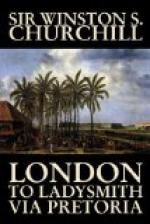I found no reason to remain very long on the plateau, and had just returned to the Brigadier when the Boer guns began to shell the tip of the hill. The first two or three projectiles skimmed over the surface, and roared harmlessly away. But the Boers were not long in striking their mark. Two percussion shells burst on the exposed side of the hill, and then a well-exploded shrapnel searched its summit, searched and found what it sought. Major Childe was instantly killed by a fragment that entered his brain, and half a dozen troopers were more or less seriously wounded. After that, as if satisfied, the enemy’s gun turned its attention elsewhere.
I think this death of Major Childe was a very sad event even among the inevitable incidents of war. He had served many-years ago in the Blues, and since then a connection with the Turf had made him not unknown and well liked in sporting circles. Old and grey as he was, the call to arms had drawn him from home, and wife, and comfort, as it is drawing many of all ages and fortunes now. And so he was killed in his first fight against the Boers after he had performed an exploit—his first and last in war—which would most certainly have brought him honourable distinction. He had a queer presentiment of impending fate, for he had spoken a good deal to us of the chances of death, and had even selected his own epitaph, so that on the little wooden cross which stands at the foot of Bastion Hill—the hill he himself took and held—there is written: ‘Is it well with the child? It is well!’
The coign of vantage which I found on the side of the hill was not only to a great extent sheltered from the bullets, but afforded an extensive view of the general action, and for the rest of the day I remained with Lord Dundonald watching its development. But a modern action is very disappointing as a spectacle. There is no smoke except that of the bursting shells. The combatants are scattered, spread over a great expanse of ground, concealed wherever possible, clad in neutral tint.
All the pomp and magnificence of Omdurman, the solid lines of infantry, the mighty Dervish array, bright with flashing spears and waving flags, were excluded. Rows of tiny dots hurried forward a few yards and vanished into the brown of the earth. Bunches and clusters of brown things huddled among the rocks or in sheltered spots. The six batteries of artillery unlimbered, and the horses, hidden in some safe place, were scarcely visible.
Once I saw in miniature through glasses a great wave of infantry surge forward along a spur and disappear beyond a crest line. The patter of the Mauser rifles swelled into a continuous rumbling like a train of waggons passing over a pontoon bridge, and presently the wave recoiled; the minute figures that composed it squeezed themselves into cover among some rocks, a great many groups of men began carrying away black objects. A trickle of independent dots dispersed




